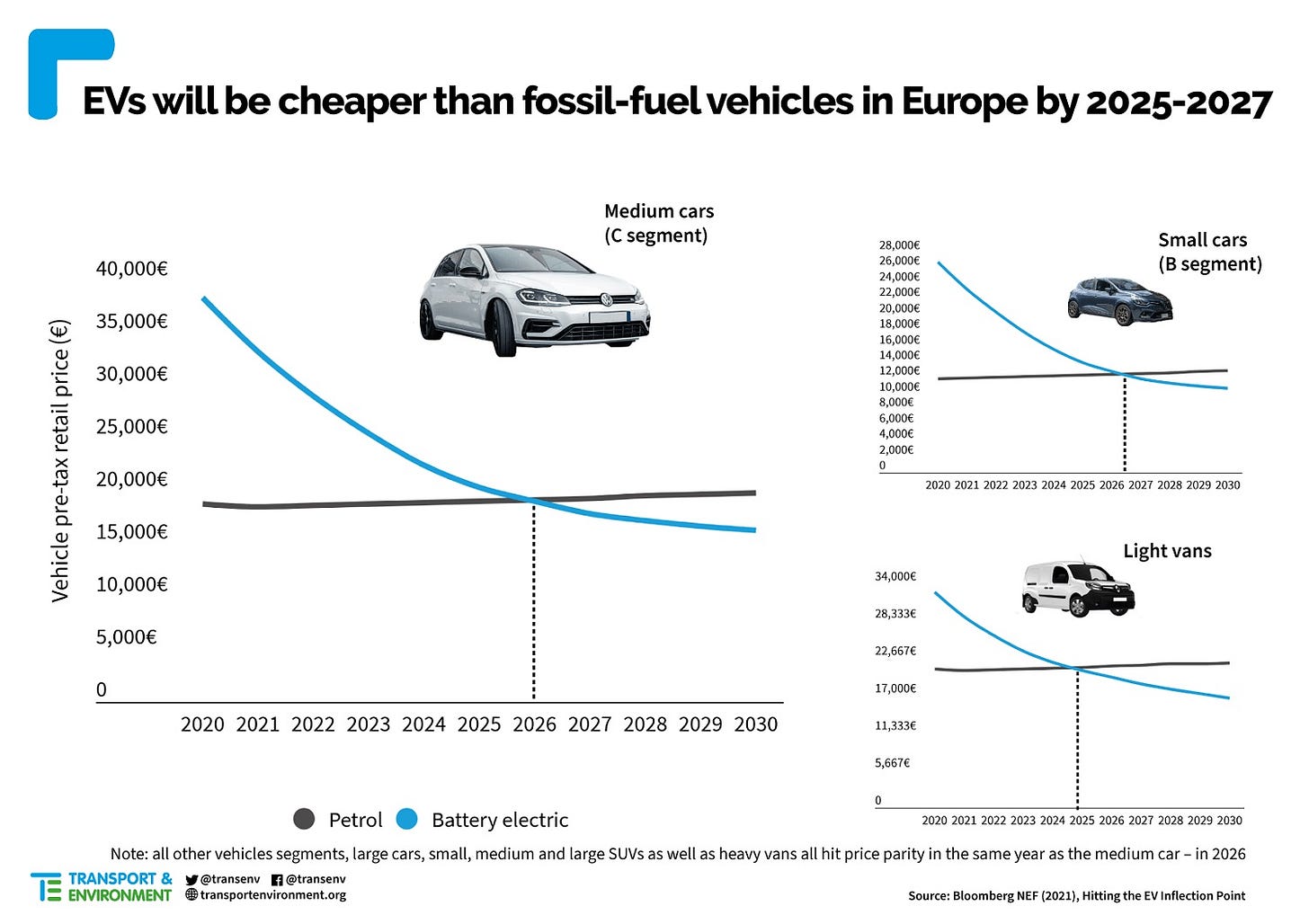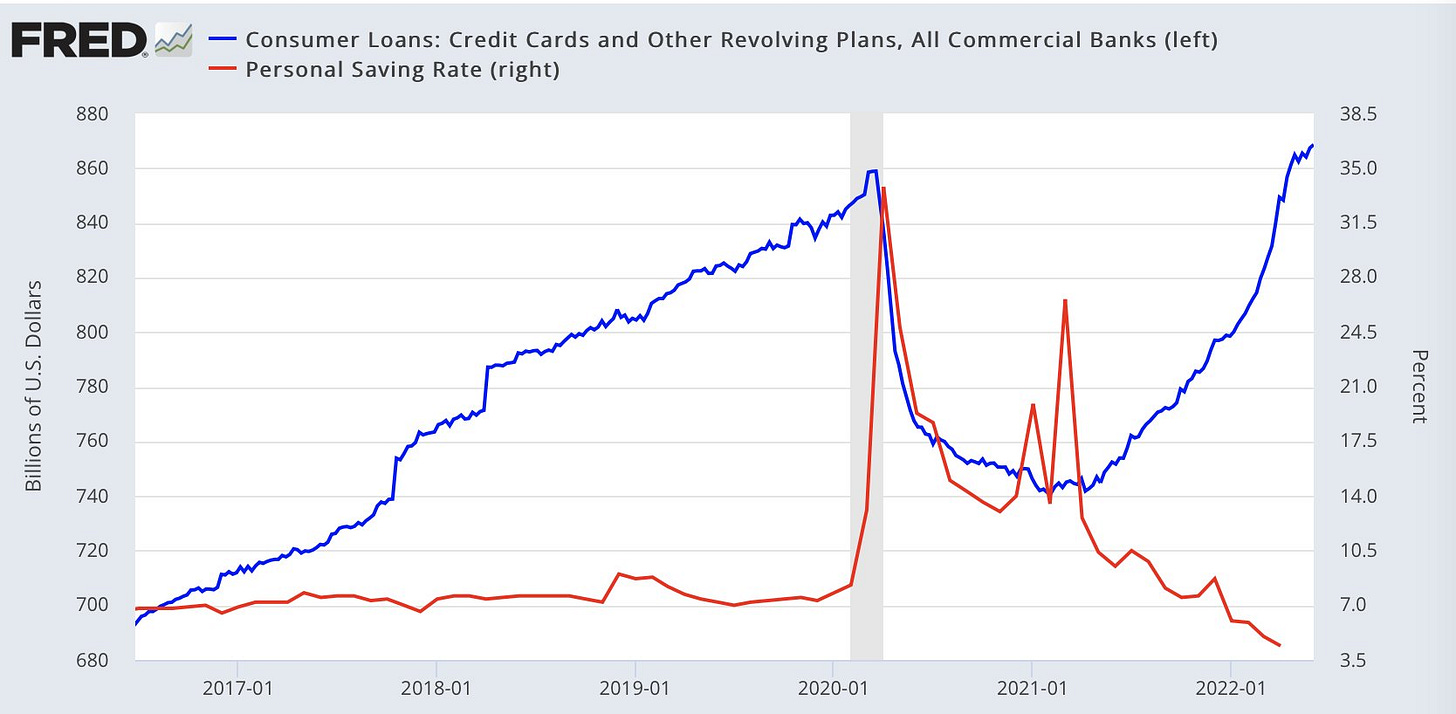🔋Bye-Bye Bolt
Regardless of total cost analysis and incentives, EVs have a higher price tag deterring many consumers from making the switch. The obsession with large vehicles only adds to the problem.
Press the heart button on this article, yes you! I would greatly appreciate it :)
The Chevy Bolt, marketed as Americas most affordable EV has officially been discontinued [1, 2]. This comes as EVs have struggled to gain market share in the US when compared to other regions. Americans aren’t rushing to buy EVs the way some other countries have seen. While wrapped up in some recalls due to battery issues, Chevy’s decision came as the plant where Bolt production is taking place will be transforming infrastructure and will soon produce electric trucks instead. Further, GM is revamping its battery pack design and infrastructure. It seems like the new Ultium battery packs are are going into larger vehicles and this design will not be compatible with the Bolt, thus it is discontinued.
Other countries have granted massive subsidies for purchasing electric vehicle, but then again the US has the tax credit so what’s the issue with Americans? Yes, Americans love their trucks, but even after the tax credit EVs remain more expensive than alternatives based on the price tag alone. This may be off-putting, especially since the credit for an EV is a tax rebate, and won’t be point of sale until 2024. This means you have to wait for your tax refund to even get the credit. It doesn’t take any value off the car and doesn’t effect the total price, monthly payment, or the interest rate. If the credit came off the list price then people would have lower monthly payments and be paying less interest on their vehicle and it would help out consumers a lot more. Yes you get some money back later, but your car is still a more expensive one.
List price may be a deterrent, in general it is easier to find cheaper list prices for ICE cars, per NYT.
At the end of 2022, the average price of an electric vehicle was $61,488, compared with $49,507 for all passenger cars and trucks, according to Kelley Blue Book
Averages can be skewed, electric vehicles take up a fraction of the total vehicle share and many EVs are marketed as luxury vehicles. Looking at Nissan though, a pretty standard car company, which have the LEAF - one of the more affordable EVs in the US. Even this company has three other models with a cheaper list price in the same category (Versa, Sentra, Altima). Without a stable charging system for the individual and with two of the models cheaper even after the tax credit, who is choosing the LEAF? In Europe for example, projections indicate that list price parity won’t be until roughly late 2025.
Even the car manufacturers are struggling to keep prices low. Ford for example lost 3 billion on their F-150 EV in the last two years equivalent to a -40% operating margin. Your local business would not be around very long with -40% margins I can tell you that. However, with EVs not being their whole business and projections that the number will swing in the other direction they are staying the course. This has not come without changes in prices for the consumers though. The F-150 EV has gone through numerous price increases, from starting at 40k to now 55k.
The main reason people are not purchasing EVs is in fact the price tag which has been studied. Second is the charging station availability, which kind of goes hand in hand with things like charge time and battery tech not being ready in my opinion. Overall, the two main reasons are economics and pragmatism. Unless people who rent can charge at work or nearby during the day it makes little sense to have a full EV.
By stopping the wallet friendly Bolt in favor of trucks, it seems like the industry is going the wrong direction and only serving to raise the average cost of an EV. Since cost is the biggest reason people are not buying an EV, this is the antitheses of solving the consumers problem. Yes, GM has a new battery platform that they are pushing, but why can’t they make designs that allow smaller, cheaper vehicles as well?
The car market in the US has trended towards larger and by consequence more expensive vehicles as seen in the left-hand side of the image below. Conversely, consumer budgets are deteriorating, leaving them with less disposable income, savings, and less ability to purchase a more expensive car in theory. Also, the easy money during the pandemic has not and will not continue for a while if the Federal Reserve is to be believed. People also pulled car purchases forward during and immediately following the pandemic due to the stimulus checks sent to households[3, 4]. Carmakers may not be realizing that this will not continue indefinitely into the future, like how governments fall for this same fallacy like I discussed last week.
It would be amiss not to mention the lifecycle cost of owning and EV vs ICE vehicle in a piece about EV cost. It is true that electricity tends to be cheaper than gasoline and that maintenance costs are lower for EVs. This leads to EVs being cheaper in the long run even today [5, 6, 7, 8]. Go ahead and debate the assumptions and methodologies all you want, but there are a number of studies leading to similar conclusions. At the current juncture though, higher interest rates on a higher price tag vehicle is certainly a lot harder for people to justify. The car market is also a unique and cyclical market with more complexities than I can outline here. Adding to that the macroeconomic environment influencing what consumers will do on top of that is crucial.
Overall the two pain points are clear; price and charging. These need to be fixed for EVs to be take over the car market. This is no small task however when the bulk of the price comes down to a complex and volatile commodity market in a less cooperative global geopolitical landscape that we find ourselves in. Until next week,
-Grayson
Optional bonus charts:
Consumer credit rising, consumers savings decreasing: How long will higher prices from recent inflation be manageable for most Americans? What happens when the unemployment rate ticks higher which has happened after every fed rate hiking cycle?
Number of expensive vs cheap vehicles sold: Whether due to inflation, the pandemic, carmaker decisions, or a mix of them all - the number of cars over 60k sold has drastically increased, while the number of cars under 25k has gone down over the last 5 years. Did people just use their stimulus checks to buy a nicer car? Will car prices revert and normalize or stay high?
Leave a like and let me know what you think!
If you haven’t already, follow me at twitter @graysonhoteling and check out my latest post on notes.
Let someone know about Better Batteries and spread the word!
Socials
Twitter - @graysonhoteling
LinkedIn - Grayson Hoteling
Email - betterbatteries.substack@gmail.com
Archive - https://betterbatteries.substack.com/archive
Subscribe to Better Batteries
Please like and comment to let me know what you think. Join me by signing up below.







